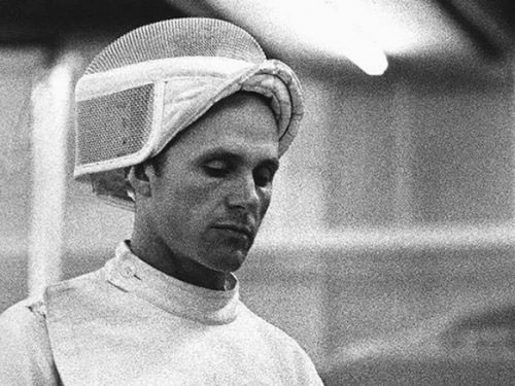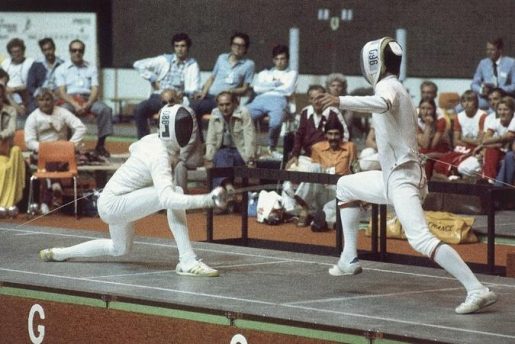Did an Olympic Fencer Cheat By Using a Rigged Epee?
Here is the latest in a series of examinations into urban legends about the Olympics and Olympians and whether they are true or false. Click here to view an archive of the Olympic urban legends featured so far.
OLYMPIC URBAN LEGEND: An Olympic athlete used a specially rigged epee to fake results during a pentathlon.
Forgive me for a reference that is out of date (and only getting more and more out of date as every day passes), but today’s legend reminds me of the long-running crime series, Columbo. The series was set up so that the beginning of each episode would show us the criminals seemingly pull off a “perfect murder” and then the rest of the show would bring in the seemingly ineffectual Lt. Columbo, who would solve the murder while we see the murderer du jour (almost always a well known actor or actress) go from confident (and almost always looking down their noses at Columbo) to, well, arrested for murder with an airtight case against them. A good deal of the episodes involved the murderers putting together some sort of convoluted contraption that would help them achieve their crime and by the end of the episode, the contraption often ended up as part of the airtight proof against the murderer. As time went by, it amused me to see these murderers continue to think that they could cobble together something to rival James Bond’s famous gadgets (“It is a pen that is really a bomb!”) without it backfiring on them. Then again, in the case of one of the most shocking Olympic cheating scandals of all-time, that it just what one Olympian tried to do – use a contraption to get away with the “perfect crime.” Only just like Robert Culp, Jack Cassidy and their ilk on Columbo, it backfired spectacularly.
Read on to learn the story of Boris Onischenko and his infamous épée…
The modern pentathlon consists of five events: pistol shooting, fencing, 200 m freestyle swimming, show jumping, and a 3 km cross-country run.
Boris Onischenko of the Soviet Union entered the 1976 Summer Olympics in Montreal, Canada as a three-time medalist in the modern pentathlon.

He won a silver medal in 1968 as part of the Soviet Union team (for the team pentathlon). In 1972, the Soviet team picked up the gold medal while Onischenko netted himself a silver medal, as well (for the individual pentathlon). Onischenko was a Soviet army officer who was well respected in the pentathlon world, particularly for his skills in fencing.
After the first event of the 1976 team pentathlon, the Soviet Union team was fourth, just behind Great Britain. The next event was fencing. It was a round robin tournament where each team member would face each other. The first hit would win each round (you would get a point bonus if you won 70% of your matches). Early on, the Soviets were matched up against the British team. Onischenko easily dispatched his first British opponent, Danny Nightingale. He was next paired up with British team member Adrian Parker. British team captain Jim Fox thought that he saw Onischenko score a point without actually touching Parker.

You see, with electric épée fencing, scoring is done in the following manner: the tip of the épée has a push button on it with wiring that, when combined with the wiring on the body cord and box of the opponent, would form a circuit (you would have to hit it with the force of 7.35 newtons and hold it for 1.1 milliseconds to form the circuit). It would then signal that a hit has occurred. Well, what Onischenko had done was to rig his épée so that he could close the circuit himself. He would press down on a pressure pad hidden in the grip of his épée whenever he would appear as though he got close enough to an opponent to register a hit and it would count as a hit.
The British team argued about the errant hit on Parker and the officials investigated the piste (the playing area in fencing) as while pistes are supposed to be grounded during electric épée fencing so that you can’t register a hit by accidentally hitting the piste with your épée, I suppose it could be possible. In any event, the officials judged that that was not what had happened. They did not inspect Onischenko’s épée, though. The tournament continued (Onischenko had now won his first four matches).
Fox was next to face Onischenko. Onischenko continued his trick and Fox went to the judges to ask them to confiscate Onischenko’s épée. They did so but the match continued, with Onischenko using a unmodified épée. As noted before, the odd part was that Onischenko was the best fencer there, and he defeated Fox with the unmodified épée. At the time, Fox did not think it was necessarily that Onischenko was cheating, per se, but that the épée was just malfunctioning. When Fox noticed the problem, Onischenko quickly said he would use another épée, but, again, Fox thought that the malfunctioning épée might be used by someone else later on in the tournament so he wanted the officials to confiscate it. So when they continued their match, it did not seem like anything was all that out of the ordinary.
After examining Onischenko’s épée, though, the judges realized his modification and disqualified him from the Olympics.
His two teammates were allowed to continue to compete, as there was no sign of a conspiracy. One of them, Pavel Lednev, even ended up winning a silver medal in the individual pentathlon. Fox and Great Britain ended up winning the gold medal in the event.
Onischenko was disgraced. Sandor Kerekes, the director of the pentathlon competition, was asked about the incident a few days later and remarked, “I know the coaches well and I don’t think they had anything to do with it, but who can really say who’s the culprit and who isn’t? Onischenko was a nice comrade. I will never get over it. I haven’t slept. I doubt if I will. To me, it’s a tremendous shock as a sportsman. You know, Monday I was sitting back in my chair thinking about my responsibilities and saying, dammit, everything is going just beautifully. Then I get this bloody call and I can’t believe it. For 20 years he has been such a tremendous athlete. Like wine, you know, he has got better with age. In the Soviet Union he is a hero, held up as an idol by the children. They have cards of him.”
After initially playing it cool with the news (as they did not really learn the extent of the cheating right away), the Soviet Union eventually came down hard on Onischenko. He was called before Leonid Brezhnev himself for a personal castigation, thrown out of the military, fined 5,000 rubles, stripped off all of his past sporting medals and was last heard of working as a taxi driver in Kiev.
Interestingly, for a discussion we had in this column awhile back about the history of amateurism in the Olympics (see here for more) and how amateurs were seen as “purer” than professional athletes, it should be noted that Onischenko was an amateur. The political pressure to win was substantial during the days of the Cold War and he was driven by motivations other than financial to cheat and in doing so, ruined what was, to that point, a well-respected career as a sportsman.
The legend is…
STATUS: True
Thanks to Simon Burnton of the UK Guardian for his excellent history of the situation.
Be sure to check out my Sports Urban Legends Revealed for more sports urban legends!
Feel free (heck, I implore you!) to write in with your suggestions for future installments! My e-mail address is bcronin@legendsrevealed.com.
Tags: Adrian Parker, Boris Onischenko, fencing, Jim Fox, Olympics





